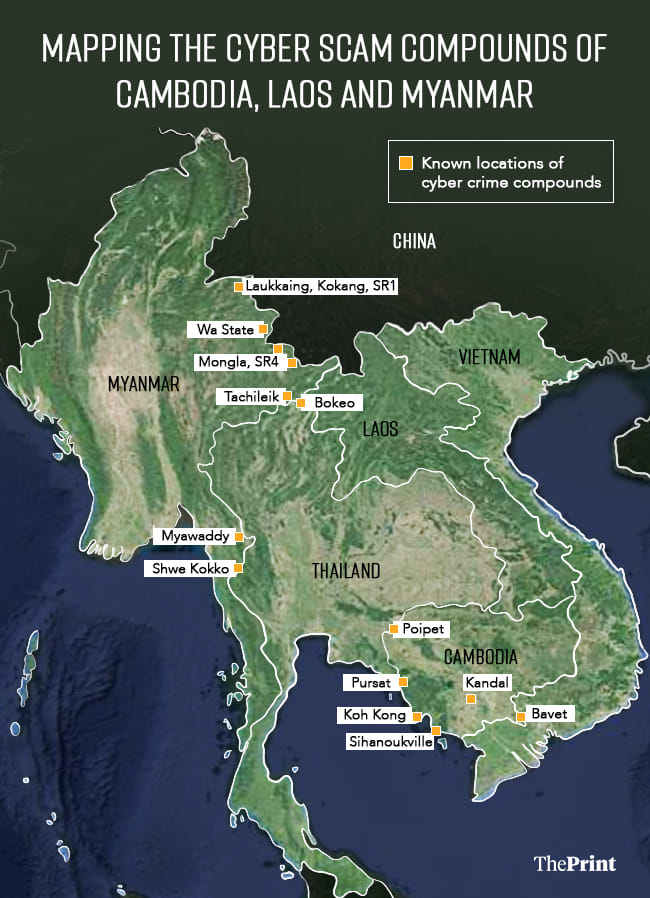New Delhi: The 549 Indian nationals employed at cyber scam compounds who were repatriated to India on 10 and 11 March, were all working at ‘KK Farm’ in Myawaddy, Myanmar, located just across the border from Mae Sot, a town in Thailand, ThePrint has learnt.
According to sources, KK Farm comprises office spaces, residential buildings, casinos, and more. It is allegedly maintained by armed Chinese personnel with an additional perimeter of protection by Myanmar’s Border Guard Forces, an armed militia operating in the border areas that are home to the Karens, Myanmar’s second largest ethnic group.
The farm, sources added, had 10 data center towers—K1 to K10—where people from India, Philippines, Pakistan, Myanmar and China were holed up as “developers”. Their role was to orchestrate scams, including digital arrests, swindling crores from victims across India, the US, Europe, and China.
More than 7,000 such individuals from across countries, primarily Chinese, were rescued by the Myanmar Army on 15 and 17 February, sources confirmed.
“To dupe people, these individuals used VPNs and proxies to conceal their identities and locations and used US-based SIM cards, which they frequently replaced,” a source said.
The Indians who were repatriated and questioned by the Central Bureau of Investigation (CBI) revealed that KK Farm is just one such complex.
“There are other such sites where thousands run the business of scamming people. The annual value of funds that are stolen worldwide has crossed 64 billion dollars,” the source said.
For this “job” the individuals were paid a salary in Thai Baht and the money which was earned by scamming people was converted to crypto with the help of finance centres that facilitated the conversion, sources revealed.
The source added that all these individuals had undergone a “corporate-style recruitment process” where they gave interviews, received offer letters before traveling to Thailand, contracts and details of salary and tourist visas. Upon their arrival in Bangkok, they were taken to Mae Sot by car and then into KK Park in Myawaddy after crossing a river, the source said.
When asked whether individuals were tortured, the source said the deportees told the CBI that while they weren’t physically harmed, they were made to work long hours and disciplinary measures for failing to meet targets included salary deductions and confinement in dark rooms without food.
They also said that some individuals were given the option to leave, but they had to make their own arrangements and pay between Rs 5,000 and Rs 7,000 dollars to do so.
The Chinese link
According to intelligence sources, the masterminds behind these farms operate out of China and receive millions in cryptocurrency from wallets linked to these scam compounds.
“There are inputs that China is running the entire show. While Indians, Pakistanis, Burmese and even Chinese hold lower positions in the hierarchy, the top bosses are Chinese,” a source explained.
The source added that Southeast Asia has become a fertile ground for such networks. However, as scrutiny in Cambodia and Thailand increased, these scam compounds were relocated to the Myanmar-Thailand border.

“There has been a crackdown by China on these scam compounds along its borders, which forced most of them to shift to the Myanmar-Thailand border, including areas like Myawaddy. They needed a safe space to operate, and Myanmar provided that,” the source said.
The source further stated that scam compounds in Myanmar have an additional layer of protection from armed border guard forces operating under the Myanmar military.
‘Tip of the iceberg’
A second source said that the magnitude of the problem is much larger than it appears. It is still not certain how many Indians are trapped in such scam compounds.
“We have been told that some individuals were tortured and even killed, but there is no concrete data available. Those who travel in search of jobs are held in prison-like conditions by armed gangs and forced to run online scams,” the source said.
Investigators believe that although Chinese law enforcement is working to dismantle these scam centers—especially since their own citizens are now being victimised, both as employees and as scam victims—they are selectively targeting some networks while ignoring others.
“This is just the tip of the iceberg, and it requires full coordination with the Chinese authorities. It appears that because this scam industry generates enormous profits, it is also being protected by influential businessmen and ruling elites in Myanmar and Cambodia who benefit financially,” the source added.
“There is a money laundering operation in place to constantly move funds around,” the source further revealed.
The source also stated that if not dismantled, these scam compounds could become a “strategic asset” for China.
“These scam compounds could be used to attack India in various ways and destabilise its economy. India can only investigate a limited portion of this operation, but unless the masterminds behind these scam compounds are brought to justice, it will continue,” the source said.
The source also said that there is the need for a focused awareness campaign to warn people against falling for such scams and traveling to Thailand or Cambodia for fraudulent job offers.
“No Indian should fall for such a scam and go to Thailand for a job. This must be advertised on war footing not just in India but also in 60 others countries from where people are lured. That is a crucial step in dismantling this industry,” the source said.
(Edited by Zinnia Ray Chaudhuri)






